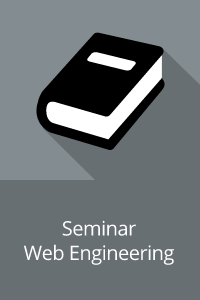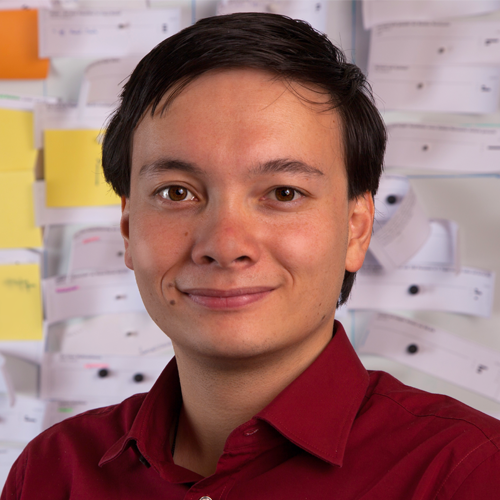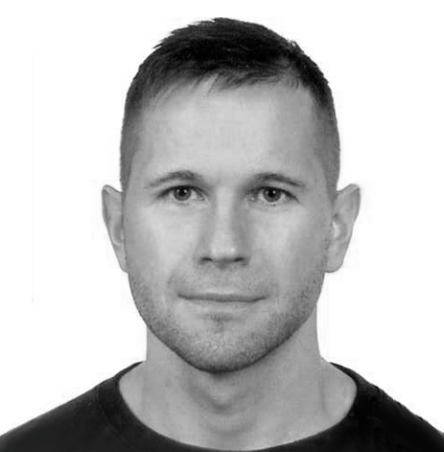
Seminar Web Engineering (SS 2016)
Welcome to the homepage of Seminar Web Engineering
This website contains all important information about the seminar, including links to available topics as well as information about the seminar process in general.
The interdisciplinary research area Web Engineering develops approaches for the methodological construction of Web-based applications and distributed systems as well as their continuous development (evolution). For instance, Web Engineering deals with the development of interoperable Web Services, the implementation of web portals using service-oriented architectures (SOA), fully accessible user interfaces or even exotic web-based applications that are voice controlled via the telephone or that are represented on TV and Radio.
The following steps are necessary to complete the seminar:
- Preparation of a presentation about the topic assigned to you.
- An additional written report of your topic.
- Each report is reviewed by two or three other particpants.
Seminar chairs


Dr.-Ing. Sebastian Heil

Participants
- Diplom Informatik (Proseminar/Hauptseminar)
- Diplom Angewandte Informatik (Proseminar/Hauptseminar)
- Bachelor Informatik (Proseminar 500110 /Hauptseminar 500070)
- Bachelor Angewandte Informatik (Proseminar 500110 / Hauptseminar 500270)
- Informatik für Sozial- und Geisteswissenschaftler (Proseminar 500110 /Forschungsseminar 500090)
- Master Data & Web Engineering (Seminar 553170 / Forschnungsseminar 500090 / DWE-Seminar 553170)
- High Performance & Cloud Computing (Forschungsseminar 500090)
- Master Informatik (Forschungsseminar M_01)
- Master Web Engineering (Seminar Web Engineering 500410)
Registration
You may only participate after registration. The registration is closed. Please try again in the following winter semester.
Topics and Advisors
Fragen:
- Wofür werden Dashboards eingesetzt?
- Welche Funktionen werden von Dashboards erwartet und welche Funktionen werden von exitierenden Implementierungen unterstützt?
- Welche Web-Technologien bzw. Frameworks werden zur Implementierung von Dashboards genutzt?
Fragen:
- Warum sollte man über "Offline"-Web-Technologien sprechen und was bedeutet dieser Begriff überhaupt?
- Eingesetzte Technologien
- Ereignisse
- Caching/Storing
- Disconnect/Reconnect
Literatur:
- eigene Recherche notwendig
Fragen:
- Was ist alles unter "Netcode" zu verstehen?
- Synchronisierungsmechanismen / Algorithmen für Onlinespiele?
- Da UDP nicht im Web verfügbar ist, wie lassen sich bekannte Methoden hier anwenden?
Literatur:
Fragen:
- Was sind Netzwerksimulatoren und was ist der Unterschied zu Netzwerkemulatoren?
- Wofür werden Netzwerksimulatoren verwendet?
- Wählen Sie einen geeigneten Simulator und demonstrieren Sie Intra-AS (z.B. mit OSPF) and Inter-AS Routing (BGP).
Fragen:
- What are big data analytics?
- What are the trends?
- What are the big data analytic platforms and tools?
- What are the research direction?
- Big data and web engineering?
Literatur:
- https://books.google.de/books?hl=en&lr=&id=5hKdBAAAQBAJ&oi=fnd&pg=PP1&dq=big+data+analytics&ots=I3gBnnaybx&sig=jV0FCrQip59YXMQ6D98jo6W1ZII
- v=onepage&q=big%20data%20analytics&f=false
Fragen:
- Welche Arten von HTML Diagramming Frameworks existieren?
- Stellen Sie die Möglichkeiten dieser Frameworks anhand von jointjs vor.
- Wofür eignen sich diese Visualisierungsframeworks, wo liegen die Grenzen der Anwendbarkeit?
Literatur:
- jointjs.com
- https://d3js.org/
- GoJS
Fragen:
- Was ist es?
- Wie funktioniert es?
- Vergleich mit REST?
Literatur:
Fragen:
- Entstehung / Motivation?
- Features der Sprache?
- Was sind Goroutes und wie/wofür verwendet man sie?
- Was ist das Anwendungsgebiet von Go?
- Anwendbarkeit für Webanwendungen?
Literatur:
- golang.org
Fragen:
- Origins / Motivation (& Serve)?
- Features of the language?
- References and Borrowing?
- How does references and Borrowing compare to Carbage Collection?
- Does Rust still have tradtional Garbage collection?
- What are use cases?
- Web applications in Rust?
Fragen:
- What is it, it's uses?
- what are the weaknesses?
- How is it applicable to web application?
Literatur:
Fragen:
- Welche Datenschutzbestimmungen in Deutschland gelten im Bereich eHealth?
- Unter welchen Bedingungen lässt sich die Cloud im Bereich eHealth nutzen?
- Welche Daten (Stammdaten, Behandlungsdaten, etc.) müssen vor Dritten geschützt werden?
- Gibt es Bestimmungen zum Speichern von Patientendaten außerhalb von Deutschland?
Literatur:
- eigene Recherche notwendig
Fragen:
- Was ist Deltamigration, warum ist Deltamigration in manchen Fällen nötig?
- Wie können Änderungen in Quelltexten erkannt werden, wie funktioniert die Zuordnung äquivalenter Codeabschnitte in altem und geänderten Code?
- Welche Ansätze für Delta Migration existieren?
Literatur:
- Sneed et al.: Software-migration in der Praxis
- diff Algorithmen
Fragen:
- Was sind Multi-device Web applications?
- Was gibt für Technik von Multi-device Web applications?
- What are the challenges for designing Multi-device Web applications
Fragen:
- Was ist NewSQL und wie grenzt es sich von NoSQL ab?
- Wie funktioniert Verteilung/Sharding?
- Wie wird JSON unterstützt?
Literatur:
- PostgreSQL jsonb
- H-Store
- SAP HANA
Fragen:
- Was ist es?
- Wie funktioniert es?
- Nutzen?
- Vorgehen bei Containern mit State (zB. Postgres)?
Literatur:
Fragen:
- Was ist SEO?
- Warum ist es wichtig?
- Aktuelle Methoden OnPage-Optimierung und OffPage-Optimierung?
Fragen:
- Was ist Responsive Design?
- Möglichkeiten?
- Wie wird es umgesetzt?
- Demo
Literatur:
- eigene Recherche notwendig
Fragen:
- Wozu?
- Wie funktioniert es?
- Wie richtet man HTTPS-Zertifikate damit ein?
- Wie werden diese automatisch verlängert?
Literatur:
Fragen:
- What is Fog Computing?
- Examples and scenarios of Fog applications?
- What are the beneifts of using it?
- What are the roles of Fog computing in IoT?
Seminar Opening
If you have not done this so far, please register in the VSR Seminar Workflow System.
The slides of the seminar opening are availablehere .
Short Presentation
Hints for your Presentation
- As rule of thumb you can plan for 2 minutes per slide. Significantly more slides per minute can be difficult to perceive for the audience.
- Prior to creating your presentation, you should think about: What should be the main message of my presentation? What should the audience remember after my presentation?
Based on these considerations you should create your presentation. - Here you can find some useful hints http://www.garrreynolds.com/Presentation/
Report
- Important Hint on Citing:
- Any statement which does neither belong to general knowledge nor stem from the author has to provided with a reference to its original source.
- "When to Cite Sources"Good overview by Princeton University
- Examples for citations can be found in theIEEE Citation Reference
- Web References have to be cited with author, title, date, URL and date of last access. Examples:
- [...] M. Nottingham and R. Sayre. (2005). The Atom Syndication Format - Request for Comments: 4287 [Online]. Available: http://www.ietf.org/rfc/rfc4287.txt (18.02.2008).
- [...] Microsoft. (2015). Microsoft Azure Homepage [Online]. Available: http://azure.microsoft.com/ (23.09.2015).
- The url has to be included as a hyperlink ("clickable").
- Further Information and Hints:
- Please use, as far as possible, the HTML elements which are used in the template. Changes to the CSS file are not allowed and will be ignored.
- Carefully check spelling and grammar of your reports, preferably using software support such as OpenOffice, Microsoft Word or LanguateTool, before uploading it.
- Check that your HTML is valid using the W3C Validator
Review
- Each seminar participant has to review exactly three reports. The reviews are not anonymous.
- Use the review forms provided in the VSR Seminar Workflow, one per report.
- Following the review phase, each seminar participant will receive the three peer reviews of his report and, if necessary, additional comments by the advisors. You will then have one more week to improve your report according to this feedback.
- The seminar grade will consider the final report.
All comments in the reviews are for improving the text and therefore in the interest of the author.


